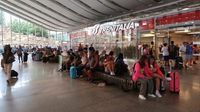On March 19, 2025, a national train strike caused significant disruptions at Rome's Termini station, where delays and cancellations adversely affected travelers. Reports indicated wait times extended up to 35 minutes for some as a result of the strike called by the labor unions Ugl Ferrovieri, Slm Fast Confsal, and Orsa Ferrovie.
The strike commenced at 9:01 AM and lasted until 4:59 PM, during which major services including Frecce, Intercity, and Regionali Trenitalia trains were expected to experience widespread cancellations and delays. Italian State Railways (FS) warned travelers of possible interruptions, stating, "Lo sciopero potrebbe comportare cancellazioni totali e parziali di Frecce, Intercity e Regionali di Trenitalia."
Travelers arriving at Termini found the situation challenging. Alongside delays, several key trains were canceled. Among them was the Regionale 4608, which was due to head to Fiumicino, and multiple high-speed trains to Milan, including the 9628 scheduled for 11:20 AM, the 9360 at 11:50 AM, and the 9632 at 12:20 PM. The Frecciabianca train 8616 to Genova, scheduled for 11:57 AM, was also among the canceled services.
The woes didn’t end there. Delays plagued many incoming trains; the regional train from Isernia arriving at 10:47 AM was delayed by 50 minutes, and the Italo service from Brescia faced a 30-minute wait. Further complicating matters were delays exceeding 100 minutes for other regional services, such as the Regionale 12524 to Civitavecchia.
Romanians commuting didn’t just endure the strike on March 19. A subsequent assessment by consumer watchdog Altroconsumo revealed enduring issues within the Italian railway system, noting that 3 out of 10 trains arriving at Roma Termini are delayed. This assessment monitored 81 long-distance train routes over 45 days, focusing on the efficiency of various services including Frecciarossa, Italo, Frecciargento, Frecciabianca, and Intercity trains.
Concerningly, Altroconsumo's findings indicated a 30% delay rate for Frecciarossa services traveling between Rome and Milan. Moreover, it surfaced that over 60% of these delays exceed five minutes, with 43% of trains suffering delays longer than 20 minutes. In response to these findings, Altroconsumo labeled the situation as "uno scenario inaccettabile per l’Alta Velocità,” reflecting significant public concern over reliability.
Interestingly, it was noted that Italo trains exhibited greater punctuality relative to their competitors. In a comparative assessment for the Naples to Roma Termini route, Italo's delay rate was recorded at 19%, outperforming Frecciarossa’s 25% over 1,000 observations made during this period. This trend suggests a competitive edge for Italo, supported by their overall performance in maintaining schedules.
Further analysis indicated that other services were not exempt from delays. The Frecciargento class, which operates both high-speed and traditional lines, was noted for delays in 41% of its operations, with specific routes like Bari to Roma Termini alarming as 95% of trains were late. The pattern of delays continued for routes like Roma to Bari, where around 80% of arrivals were also delayed.
As the investigation delved deeper, it revealed that nearly half of the Frecciabianca trains on the Roma to Genova route were late, while Intercity trains across 57 routes reported an average delay rate of 29%. This scrutiny revealed systemic inefficiencies that have lasting implications for passengers.
Highlighting the pressing issue, Altroconsumo stressed that current refund policies for services impacting travelers are inadequate. Presently, only delays exceeding 30 minutes result in partial ticket reimbursements for both Trenitalia and Italo passengers. Here, Altroconsumo argued a shift in policy could greatly benefit commuters, suggesting a lowered refund threshold to 15 minutes. This adjustment would potentially double the number of trains eligible for reimbursement from 5% to 11% on routes like the renowned Frecciarossa from Milan to Roma.
As the situation at Roma Termini continues to unfold amidst calls for better service standards, the events of March 19 reflect larger issues within the Italian railway system. With ongoing union strikes and concerns looming over punctuality, it is evident that the path ahead calls for reformation to enhance the travel experience for all citizens. Addressing these operational challenges, especially in light of rising passenger expectations and safety standards, remains pivotal for the future of Italy's railways.





